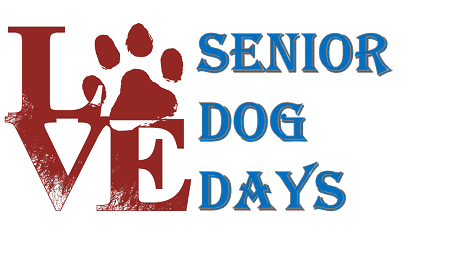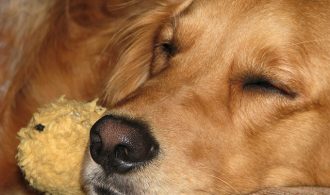Some content may contain affiliate links to products which means we could earn a fee on your purchase. Thank you for visiting
Eventful days or strenuous activities will tucker your senior dog out quickly. As she ages, your senior dog will require more and more sleep in order to feel rested, and recuperate from her daily activities.
If you’re worried about the number of hours your senior dog is sleeping, check out this chart to see how other senior dogs sleep in comparison.
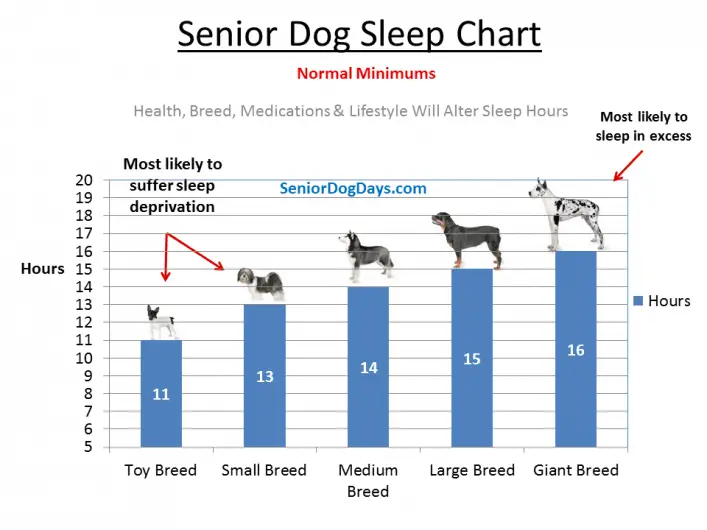
Other obvious factors that contribute to the quantity and quality of senior dog sleep are: overall health, diseases, medications, breed, and age.
The “not so obvious” factor that contributes positively or negatively to your senior dog’s sleep is: The Human Factor, and that’s what we’ll be talking about today.
But before we get into how we humans may be helping or hurting our senior dog’s chances for a good nights’ sleep, let’s first address a more immediate concern in sleep pattern: the sudden change.
Observing a gradual increase in your senior dog’s sleep in common. However, what is not so common and not to be taken lightly, is a sudden change in your senior dog’s sleep patterns.
Sudden Change in Senior Dog Sleep
Let’s say you arrive home from work at 6pm and spend an hour in the kitchen tidying or preparing for dinner. Normally, your senior dog is in the kitchen with you, maybe he’s resting on the floor, but he’s awake and watching…hoping for something good to fall.
Today, something is different. You arrive home, start making dinner and he’s in his bed sound asleep.
While dogs sleep more as they age, they do not suddenly sleep 12 hours if they usually sleep 8, nor do they suddenly sleep through a highlight of their day such as you coming home.
That’s a big change and best to go through your standard checklist and address with a vet call or office visit to rule out illness.
If you’ve ruled out illness and still have a concern with your senior dog’s sleep patterns, or if your senior dog seems tired all the time… then it’s time to look within.
How Humans Deplete the Senior Dog Sleep Bank
Not getting a good night’s sleep is tough to recover from and about the only cure is: to get some sleep. Unfortunately for some senior dogs, the effects of poor sleep quality begin to compound and take their toll early.
Of course we don’t mean to, but we humans could be depriving our senior dogs of much needed rest. Let’s take a look at how we might be (inadvertently) contributing to a poor night’s sleep for our senior dog.
More importantly, we’ll discuss the simple changes we can make to help ensure our senior dog will get the quantity and quality of sleep they need and deserve as they journey through their senior years.
Sleep Deprived Senior Dogs – The Things We do
Toy, Small and Medium Breed Senior Dogs
Toy breeds are bred to be human companion dogs. They can sleep as long or as little to fit in with their human household as long as it’s within reason.
Small and medium sized dogs are bred for a vast variety of reasons and share something in common with toy breeds: they are more likely to be sleep deprived because of normal human tendencies.
Human Tendencies: Toy, small and medium sized dogs often sleep in their owner’s bed. They take naps on their owners lap, and are more easily woken by household activity.
The smaller breeds are easy to pick up and therefore, we do! We pick them up throughout the day and sometimes that disrupts their sleep.
Sleeping in the same bed with your senior dog is not the issue if you’re getting a solid (restful) 8 hours of sleep a night and work during the day.
However, if you are only sleeping 5 hours per night, or you sleep erratically for 8 hours, AND you’re home all day long, it’s not going to be enough sleep or alone time for your senior dog to replenish her sleep bank.
Over time, this constant lack of sleep can cause complications in your senior dog’s health. She may be zapped of energy, more susceptible to health issues and less socially interactive.
How you can help: Regardless of breed size, if you think your senior dog is tired, and not getting enough sleep you’re probably right. You can help her sleep by setting her bed in a quieter portion of the house.
If you are a restless night sleeper, she should have her own bed so she’s not jarred awake every time you move.
If you are home during the day, consider initiating a nap routine by placing your senior dog in a room to sleep for a couple of hours, or putting her bed in a quiet zone so she can get her much needed zzz’s.
A little tv on in the background might help keep her from hearing household activities and lull her to sleep.
Large & Giant Breed Senior Dog Sleep
Maybe your large or giant breed sleeps in your bed, but as they get older, getting into bed with you isn’t an easy task and our large breed seniors are demoted to the floor.
The floor is a good and a logical location, especially if you are keeping your dog awake. But the floor, on its own, is not a great place to sleep without some added comforts.
As our dogs turn into seniors, they lose muscle mass. Because of this, our large breed and giant breed senior dogs need good support that will provide cushion between their older, pointy joints and the hard floors.
Our large and giant size senior dogs definitely need their own right-sized, comfortable bed.
Human Tendencies: Even if our big boys and girls have big comfortable beds, our tendency is to station these bulky obstacles in the corner of a room; out of the way…otherwise everyone would be tripping over it.
Because their beds are more secluded, they may not be subjected to daily household activity but these out of the way locations are more likely to result in your senior dog losing sleep due to cold, hot, stagnant, or drafty conditions.
Exterior walls are cold in the winter. Baseboards and windows can have ice cold drafts aimed right at your dog’s arthritic hip. Corners have no air circulation and could be several degrees warmer or colder that the rest of the house. Hallways have a constant breeze.
How you can help: All dogs benefit from having their own comfortable bed and the number 1 thing you can do for your senior dog’s sleep comfort is: invest in a good quality dog bed. Since they are expensive, buying the right bed, the first time can help save money. Here is a tutorial that teaches exactly why dog beds are designed differently and which design is best for your dog’s sleeping habits and health issues. Guide to Dog Bed Designs Tutorial
Your dog should be able to sprawl without falling out onto the floor. So, when in doubt: size up.
If your dog travels upstairs for bedtime and sleeps downstairs during the day, life will be easier if you have 2 beds.
Moving the large beds everyday is not convenient. And when things aren’t convenient, we are more likely to forget and that will result in your senior dog having to sleep on the hard floors .
Next, to make sure your dog’s bed is in comfortable location, lie down on it for 10 minutes and see how you feel. Open nearby doors and see if it causes an uncomfortable draft.
A handheld infrared laser thermometer like this one at amazon (infrared thermometer) is a real eye opener. Point the beam on the floor near your dog’s bed and you might learn that their bedding area is 10 degrees colder or hotter than the rest of the house.
If after sitting in his bed for awhile you feel bad, cold, hot or stuffy, your senior dog probably feels bad all those too. No doubt his quality of sleep might be suffering, especially if he has arthritis. Move his bed to a better spot in the home. Here is a great article that shows you how much temperature can vary in my own living room.
If you want your big dog in bed with you and you you’ve always slept well together, consider stairs up to your bed. Alternatively; as long as it’s a comfortable spot, place his bed right beside yours on the floor so you’re within arm’s reach.
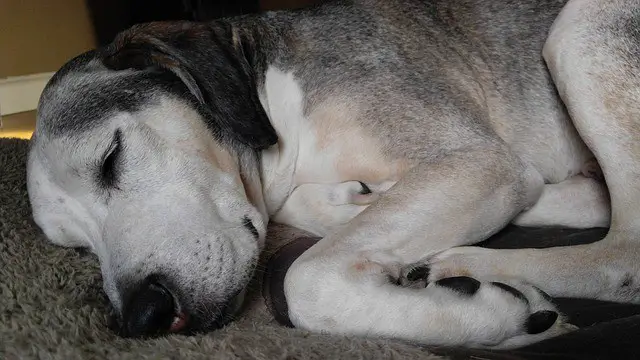
Sleep Deprivation While Traveling or Receiving House-guests
Sleep requirements do not change when you travel with your dog or have guests in your home. What does change, though, is your senior dog’s sleep schedule.
Her sleep routine goes out the window and she doesn’t get to take her normal naps.
If your senior dog naps 3,4,8 hours during a given day, that is way too much sleep for her to lose when traveling or enjoying the company of house-guests. And if your plans will be longer than one overnight, your senior dog is going to be absolutely exhausted.
Let’s take a look at how car trips and houseguests contribute to sleep deprivation in our senior dogs.
Senior Dog Sleep and Car Trips
When traveling via car, you may notice that your dog doesn’t really sprawl out like they do at home. If this is the case, then your senior dog is likely keeping herself in a position that utilizes all of her core muscles and that means: she remains awake.
Long car trips where she has to keep herself steady in a car, are exhausting for senior dogs and can cause a sore body that lasts for days.
How you can help: Make frequent stops so your senior dog can get out and relax her core muscles. Drive steady – no jerky lane changes or on–the-gas off-the-gas style driving. Think smooth!
Burrito style car seat slings or hammocks (product link) are a great way to help her feel more steady in the car. She may actually relax against one side and take some of the pressure off her core muscles.
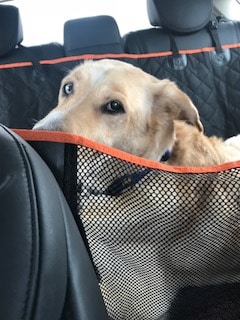
House Guests or Visiting Other Homes
Whether you’ve got friends coming in for a weekend or you’re taking your senior dog on a weekend trip to see family, his sleep is going to suffer.
Make sure your dog can have a quiet spot to take a good long nap during the day. They may fuss at being put into a room, but turn up the tv and let them sleep for a couple of hours.
I do this with my senior dog when visiting my parents’ home. I put his bed in a quiet bedroom, give him a skimpy filled kong and turn on the tv. After a good nap of at least an hour, sometimes two, he comes running out of the room refreshed and playful, wearing a big smile on his face.
He is more enjoyable with the family…just like a toddler would be after a nap and more importantly, his senior body had a chance to replenish and rejuvenate.
For our big breed dogs, I know firsthand that traveling with a large, orthopedic bed can have its challenges. They don’t really roll up and sometimes we simply don’t have room in the car for their regular bed.
A great quality travel roll up bed can be a welcome alternative to trying to shove and squish their giant, regular bed into the car or worse yet, making them go without a bed.
Medications
As your senior dog ages, medications enter. It’s not uncommon for senior dogs to be on joint supplements, pain relief, anxiety relief, allergy relief, incontinence and thyroid meds (the list goes on).
The combination of all these medications could absolutely cause your senior dog to be sleepy, drowsy or even unable to fall asleep.
While there is not a lot you can do when your senior dog needs these medications to manage through his life, you can make sure that sleep inducing pills are given at bedtime vs morning (when possible).
Also, remember that as your dog ages, they gain or lose weight. Medications are prescribed by their body weight which means you could be over or under dosing your senior dog.
Weighing her regularly (not just at the vet’s office) will help ensure your pet is not losing sleep because of the over or under dosing of medications.
Things to Remember
Remember you are a pillar in your senior dog’s healthcare. Getting enough quality sleep helps your dog deal with current health issues and gives her a fighting chance to have the energy required to fight off other ailments.
Little by little, the lack of quality sleep has negative compounding effects. Anything you can do to make sure she can get some quality sleep while at home and traveling will pay big dividends down the road with your senior dog’s quality of life and good health.
My Senior Dog’s Sleep Patterns
My dog Frodo is a 12 year old Extra Large Breed Senior Dog. At his peak ideal youth weight he was just over 100 lbs. Today he is a healthy 90 lbs. He eats a homemade raw diet that we make in bulk about every 3-4 weeks.
Frodo suffers from hip and spine arthritis, hypothyroidism and a little hearing loss.
I go over everything we use and love in here Arthritis for Dogs Review of Supplements.
In total, he gets between 13-16 hours of solid sleep per day on top of some light naps.
I’m always watching for changes in his sleep, keeping his bedding clean, checking his bed for comfort, and making sure he gets naps when we travel.
Once you get a routine, everything falls into place. Any small changes you can make will go a long way in cultivating a healthy sleep schedule so your senior dog can get her daily dose of recovery.
Thanks for visiting Senior Dog Days
